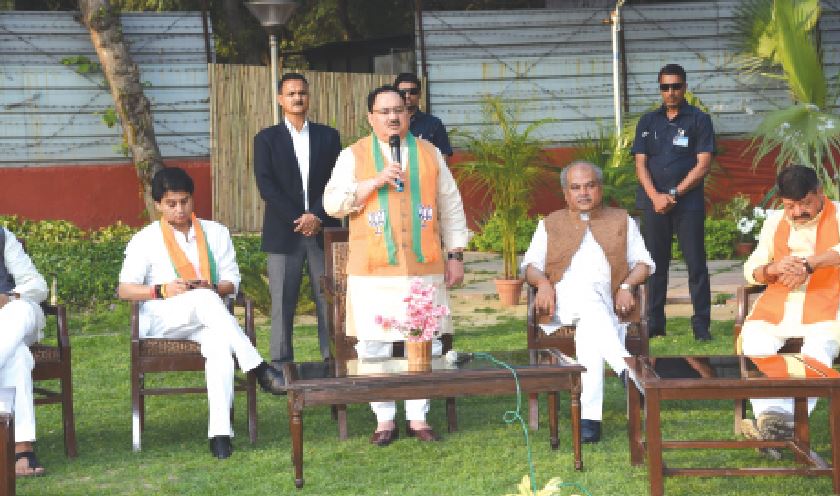 With Congress government led by chief minister Kamal Nath tendering resignation even prior to facing the floor test as directed by the Supreme Court, the stalemate over fragile political situation in Madhya Pradesh can be said to have been over temporarily and decks were cleared for the BJP to stake its claim to form the next government after a hiatus of about 16 months. Shivraj Singh Chouhan, who was sworn in by Governor Lalji Tandon on March 23, finally returned as chief minister of Madhya Pradesh for the fourth time, over 15 months after his government was voted out of power.
With Congress government led by chief minister Kamal Nath tendering resignation even prior to facing the floor test as directed by the Supreme Court, the stalemate over fragile political situation in Madhya Pradesh can be said to have been over temporarily and decks were cleared for the BJP to stake its claim to form the next government after a hiatus of about 16 months. Shivraj Singh Chouhan, who was sworn in by Governor Lalji Tandon on March 23, finally returned as chief minister of Madhya Pradesh for the fourth time, over 15 months after his government was voted out of power.
For the past few weeks, the Kamal Nath government was grappling with a political crisis that had been engendered in the wake of exit of Jyotiraditya Scindia. 22 MLAs, including some holding ministerial posts in the Congress government, owing allegiance to Jyotiraditya Scindia, also resigned from the Congress and declared their support for the BJP; thereby, rendering the Kamal Nath government in a minority.
Congress MLAs who declared their support for the BJP were taken to Karnataka without brooking any delay where efforts by the Congress leaders to contact them did not succeed. These developments obtaining in MP bear a parallel to what had happened in Maharashtra and Karnataka where the incumbents lost to their rivals. The BJP deserves credit for setting a trend of overnight change in the party in power at the state level that has been witnessed in recent years in Goa and some states of the North-East India, what has been termed by an expert, as “signifying emergence of a new political culture of ideological malleability in terms of the degree, if not kind.”
The Budget Session of MP Assembly that commenced on March 16 was adjourned till March 26 by the Speaker amid coronavirus apprehensions and this was followed by uproar in the assembly. In the wake of Congress government being reduced to minority after the resignation of 22 MLAs, the BJP demanded floor test which was not approved by the Speaker.
BJP’s gambit
Admittedly, with the entry of Jyotiraditya Scindia along with 22 MLAs, the BJP camp in MP is feeling jubilant with the prospects of forming the next government. However, what is interesting to watch is as to who will be the chief minister. Undoubtedly speculations were rife about Shivraj Singh Chouhan to be sworn as the chief minister for the fourth term. Some experts had opined that BJP’s top brass has thus far disallowed emergence of any powerful state leader fearing emergence of a rival to challenge their grip on the party. These experts cited the examples of sidelining of Raman Singh and Shivraj Chouhan who had served for three terms continuously as chief minister in their respective states.
It becomes discernible from multiple media reports that MP unit of BJP is faction-ridden. One faction is headed by former CM Shivraj Singh Chouhan and another group is headed by Narottam Mishra.
And with the joining of Jyotiraditya Scindia along with his supporters, the possibility of another rival group headed either by Vasundhraraje Scindia or Jyotiraditya Scindia cannot be ruled out. In that eventuality, the ephemeral jubilation over induction of Jyotiraditya Scindia in the BJP camp can prove to be a permanent liability for the rival camps within the party.
Congress’ Dilemma
 Keeping in view the backdrop of developments obtaining in MP over the past many months that finally culminated in the exit of Jyotiraditya Scindia along with his supporters thereby leading to the ouster of Congress government led by CM Kamal Nath, central leadership of the Congress is seemingly accountable for this downfall because of its either incompetence or miscalculation or deliberate insistence on letting the things go haywire. Madhya Pradesh is not an example that has occurred in isolation, similar instances have already taken place in Goa, Meghalaya and Karnataka and the top brass in the Congress has refused to learn from such mistakes and rather has continued to take such occurrences for a ride.
Keeping in view the backdrop of developments obtaining in MP over the past many months that finally culminated in the exit of Jyotiraditya Scindia along with his supporters thereby leading to the ouster of Congress government led by CM Kamal Nath, central leadership of the Congress is seemingly accountable for this downfall because of its either incompetence or miscalculation or deliberate insistence on letting the things go haywire. Madhya Pradesh is not an example that has occurred in isolation, similar instances have already taken place in Goa, Meghalaya and Karnataka and the top brass in the Congress has refused to learn from such mistakes and rather has continued to take such occurrences for a ride.
Media reports explicitly denote that Congress is faction-ridden; and undoubtedly, factionalism is a common feature characterizing almost all political parties across the spectrum in India; nonetheless, Congress is more acutely afflicted by this malaise. Priority to loyalty to the leader rather than to the party is a bad precedent that ultimately ruins the party.
Youth of the day is seemingly not attracted towards Congress but falling an easy prey to the propaganda blitzkrieg of the BJP. It is high time for the Congress top-brass to address this malaise and devise well-concerted strategy to attract capable and dynamic youth to its rank and file, if it wants to be reckoned with as a political force in the Indian politics.
Resort Politics
A new trend, known as ‘Resort Politics’, has come to roost Indian political firmament for past some years wherein defected elected representatives to parties other than the one on which they got elected are kept in resorts until incumbent party is ousted from the power. A dangerous trend extremely detrimental to the cause of democracy is gaining traction of which Madhya Pradesh is the latest example.
This resort politics was first experimented in Karnataka successfully by the BJP. In Karnataka, when MLAs resigned from the Congress, they were kept in a resort/hotel and this political gambit resulted in the change of the Congress-JD (S) government and induction of BJP leader Yedyurappa as CM.
The same Karnataka experiment was replicated by the BJP in Madhya Pradesh, where, as per the media reports, the 22 Congress MLAs, who suddenly were obsessed by a longing to enjoy the hospitality at a resort and escaped to Bangalore, were induced by monetary gains and the prospect of gaining ministerial berths in a new government led by the BJP.
Some experts have opined that millions of rupees must have exchanged hands in bargaining. Even if these defected MLAs fail to gain ministerial berth in the new BJP government, they would not be able to nurse any grouse owing to having received large sums of money for defection and fear of raids by the enforcement directorate or CBI will force them to keep mum.
Governor vs. Speaker
Devolution of the political crisis into a constitutional crisis in Madhya Pradesh has brought into sharp focus the need for clear delineation of the constitutional powers and propriety of the actions of the Governor and Speaker of the State Assembly. In the case of Madhya Pradesh, Speaker’s refusal to accede to the request of the BJP to conduct floor test on the very inaugural day of the Budget Session and adjourning the Assembly till March 26 and the subsequent action of the governor to conduct floor test and Speaker’s refusal to do so brought to the fore constitutional crisis in the state.
As per media reports, the Congress leaders in MP argued that invoking Article 175 (2) of Constitution by the state Governor calling for a floor test rendered it a recommendation not a direction and the final authority in this regard was vested with the Speaker and not the governor.
Viewed in a broad spectrum, the entire sequence of events occurring in MP was on the same pattern that took place in Karnataka last year where the MLAs resigned, Speaker procrastinated on their resignation application, Governor’s direction to the Speaker to conduct floor test was ignored and finally the intervention of the Supreme Court settled the issue.
Same sequence of events has been replicated in MP as well.
It devolves on the apex court to set the record straight once and for all because recurrence of such events will continue to rule the roost in the deteriorating democratic institutions and traditions under the given circumstances.
Allegiance of the governor or the speaker to the party in power or to the Constitution is a big question mark to which no political party is serious enough to resolve because it suits every party at one time or the other.
Way Forward
In their mad rush to grab power by hook or crook, political parties of all hues have reduced democracy and democratic institutions to a mockery.
Frequent incidents of defection of elected representatives through the lure of money and power has made anti-defection law virtually redundant.
For gaining hold on power, political parties are prepared o go to any extent and by doing so these parties are doing disservice not only to the nation but to their cause as well because what A does to B today then B will repay A in the same coin.
And in the entire process ultimate victim is the electorate whose faith and trust in parties gets eroded. Can the parties ensure non-recurrence of MP or Karnataka style episodes? Perhaps not, because in this game of throne, it is the throne that is accorded priority and not the means to win the game.
letters@tehelka.com












